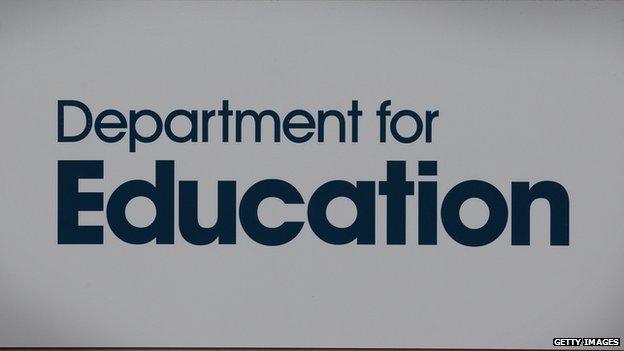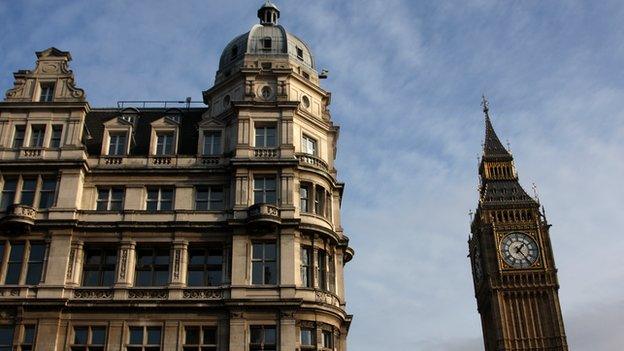Is there trouble ahead for Freedom of Information?
- Published
- comments

The government has confirmed today that it is "considering" amending the Freedom of Information Act to make it easier for officials to withhold information from the public - a consequence of the Supreme Court judgment in March that led to this afternoon's release of the Prince Charles "black spider memos".
The original transparency legislation, passed in 2000, contained a provision which gave the Cabinet the right to simply kill requests even if a court had ordered that the request be answered. It was used, for example, to block requests for documents relating to the decision to go to war in Iraq, the recent English NHS reforms and the proposed High Speed 2 rail link.
The judges, however, concluded that the veto was an unlawful provision: they did not like the notion that the executive could simply overrule a court without any constraint. So, for now, the Act is operating without a backstop by which ministers can zap requests. So if members of the public go back for those vetoed releases now, they might well be able to get them.
That ministers want to bring in fresh law to reintroduce the veto is not an enormous surprise. David Cameron responded to the court ruling at the time by stating: "If the legislation does not make Parliament's intentions for the veto clear enough, then we will need to make it clearer". There are some things to be aware of.
The civil service proposals
First, whatever happens, there will be no further royal letters. The law has already been amended to make this release into a one-off.
Second, while some form of veto may return for the FoI Act, it is not quite clear what it will cover. To conform with the judges' wishes, it would need to be reconfigured and constrained in some way.
Third, there are parts of the old veto that are not coming back. The little-known Europe-wide Environmental Information Regulations, external cover information releases about physical spaces or the environment. It is a tough little law, which is hard to avoid. And its roots in European law mean that it is harder to change than the conventional Freedom of Information Act. So that is now probably veto-free forever.

The Department for Education instant messenger systems destroys its data immediately
Fourth, I would not be surprised if they used the opportunity to cut back transparency requirements. As I wrote in March, a senior legal official told me they might "sort out a few other things while the patient is on the table". Requesters should be nervous. So what exactly might they do?
The civil service has proposed previously that time officials spent "considering" requests and redacting them should be capped. These proposals could be lethal to the act in Whitehall. At the moment, officials are asked to estimate how much time it would take to find documents. If the estimate is that it could cost more than a certain limit, they go no further. A common complaint about the lowest transparency departments is that they often lie to inflate these costs so they can refuse releases.
Now imagine how much worse that would be if they were also asked to add in how much time they expect to spend "thinking" about a request and the amount of time they might need to spend blacking out contentious information. It would be an invitation for the worst parts of Whitehall to refuse requests at will.
You might think that sounds conspiratorial. It is. But remember how much some parts of the civil service hate transparency. It is already quite common for officials to mark documents as "policy" and "sensitive" because they (incorrectly) think it will make it easier to refuse requests. The Department for Education installed an instant messenger system that is set up to destroy data immediately so conversations are never recorded and so can never be requested.
The enforcement problem
Indeed, at the moment, officials know that in some departments, finding innovative ways to refuse requests is a way to win kudos from senior mandarins. Requests signed off by Roger Smethurst in the Cabinet Office and Nicholas Howard in Downing Street both stand out for their determination to avoid disclosure. That dark corner of Whitehall is particularly secretive.

Parts of Whitehall remain particularly secretive
Indeed, Sue Gray (job title: "Director General, Propriety and Ethics Team") at the Cabinet Office has given advice to special advisers on how to destroy data in their email accounts specifically in order to avoid needing to make disclosure. She has also pressed officials in other departments to resist releases, even ones they were relatively relaxed about making.
Why does this keep happening? Well, the Information Commissioner's Office, which is responsible for enforcing the act, is routinely quizzed about this (often by me). But nothing ever happens. Indeed, the continued refusal to act against the worst offender has spawned its own website, simply entitled: "Has The ICO Issued An Enforcement Notice Against the Cabinet Office Yet?", external
Even before one considers what officials might now try to do to our most important transparency law, it is important to note how weak the act is already. There is a serious compliance problem in Whitehall, and the ICO has decided not to do anything about it.